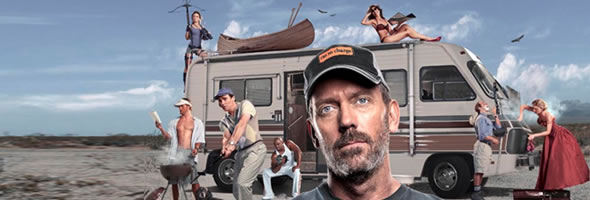HOUSE: The Tyrant
October 7, 2009 by Erik Wilkinson

James Earl Jones is an imposing figure, and his guest appearance on House was bound to be more impactful than a lesser known actor. The story of President DiBala altered the formulaic presentation of the show, foreshadowing personal & professional struggles ahead for Princeton Plainsboro’s staff.
Before I dive into the key story arcs, let me say two things. First, it took me almost half the episode to believe that Mr. Jones was portraying a cruel, calculating dictator. I was distracted by the thought that his entire story was a series of deleted scenes from “Coming to America,” hoping that any moment could bring a cameo by Arsenio Hall or the rose-carrying servants who would administer the royal sponge bath! Second, Cuddy’s decree that House avoid patient contact denied the audience a showdown between Hugh Laurie and the voice of Darth Vader. Was it too much to ask for House to “accidentally” sneak into DiBala’s room while grabbing a cup of coffee. After all, breaking and entering is one of House’s most cherished hobbies.
Based on last week’s teaser trailer, I assumed that this story would focus on House’s relationship with Foreman. With House’s medical license still pending in bureaucratic limbo, it was logical that his understudy would continue to assert his new authority, leading to a series of tense squabbles. Wisely, the creative team allowed that tension to boil temporarily, but tabled it for later episodes. Season Six is shaping up as a year of transition, and Foreman’s journey is paramount to that end result.
As Foreman, Chase, and Cameron struggled to treat DiBala, House embarked on a mission to save Wilson from his condo commandos. In Florida, tales of neighbors shunning one another over the size of flower pots or a disputed parking spot are commonplace. Because Wilson is a kind person at heart, his first inclination was to appease Murphy, the combative neighbor. In House’s educated opinion, swifter action was needed. Though much of Hugh Laurie’s screen time was spent generating laughs this week, both in and out of the office, I found his efforts to cure Murphy significant. The promise of this season was that House would emerge from Mayfield Psychiatric Hospital as a changed man. For much of this episode, I was concerned that we would see no signals that House’s treatment was instructive. Taking away 36 years of Murphy’s pain was a humane gesture. Was this a sign that House’s return to medicine will provide him with true satisfaction, rather than simple narcissistic pleasure?
Peter Blake’s intricately woven script addressed a profound conflict within a doctor’s oath to do no harm. What happens when adhering to that oath could lead to the harm of thousands, if not millions, of other people? Rather than turn this into a political discussion, I would say that Jennifer Morrison and Jesse Spencer did an amazing job reminding the audience why Cameron & Chase were missed last season. After a year when their wedding was treated as an incidental plot point, the young doctors were up to the challenge of driving the “A” plot of this episode. I loved the shift in tone midway through the story, as Cameron faced down her dark side (sorry, had to go for a Star Wars reference) and elected to save DiBala, while Chase evolved from a physician into an advocate. The couple’s pointed debates about a doctor’s obligations were stirring, and Chase’s shocking actions will have long-lasting implications for both his career and his new marriage.
Isn’t it a shame that Cameron & Chase can’t act like newlyweds once in a while, flirting openly and disappearing into break rooms for Seattle Grace-style relations? Just once, it would be lovely to see these two kids in love. Are you listening, Katie & David?
I have not decided if I like the Season Six version of Foreteen yet. Their scenes together have dealt plainly with the challenges of a workplace romance, which I appreciate as a viewer. On the other hand, I am waiting for the other shoe to drop on Foreman’s stubbornness, which appears to be costing him personal joy and professional success. Stay tuned for a longer diatribe about these two next week.
Oh, and James Earl Jones has become an overacting caricature of his former self, and his performance was a knockoff of Forest Whitaker’s breathtaking work in “The Last King of Scotland.” Until Eddie Murphy calls about a sequel for the people of Zamunda, we need to keep him away from these regal parts.
What are your thoughts on Chase’s controversial decision? What will happen to him, personally and professionally? Was James Earl Jones the right choice to play President Dibala? Are you rooting for Foreman and Thirteen to work things out? Did House’s reentry to the hospital seem like a fresh start to you, or a slightly more energetic retreat of his usual self?
Erik’s summer was wasted with marathons of The Next Food Network Star and MTV’s 16 & Pregnant. After weeks of comparing risotto dishes and dishonest baby daddies, he is thrilled to be writing about House and Parks & Recreation for GMMR again!
Related Posts
Filed under #1 featured, House, House Recap, Posts by Erik



I really enjoyed this episode. It was intense, dramatic and on top of it all, had a fantastic guest star. I liked that the old gang was back together (never truly cared for 13, Kutner or Taub), so I was fully embracing their return.
I guessed that Chase would do some shoddy doctoring in order to kill Jones’ character. The storytelling was a bit predictable, but hey, it was drama at its highest point. I did like that Chase and Cameron were FINALLY given their due and actually prominently featured in a HOUSE episode. It’s just unfortunate that Cameron will no longer be a regular after November. I do agree with you in that HOUSE almost always borders on the serious and the melodramatic, and it would be a nice change of pace to show some lightness with the docs at Princeton-Plainsboro. Seems like everyone’s always acting with a heavy heart or something.
I actually did like that HOUSE was forced to take a backseat in this episode and look forward to seeing more of Chase, Cameron and even Foreman.
I have never met anyone NOR read anything from anyone, anywhere, who likes “Foreteen.” But there they are, front and center, incessantly present and incredibly boring. As for Chase/Cam, well, we all know what’s going to happen with THEM!
And, when it comes to “Katie & David,” they lost their way a long time ago and betrayed a large section of House fans who had faithfully followed them from Day One. Why set up the subtle flirtation between House & Cam for 2+ seasons if they were just going to drop it cold after that? Jennifer obviously ticked off someone way high up in TPTB, but, OTOH, Epps must have some serious blackmail material so as to keep himself front & center. That’s the only way I can make rational sense of what they’ve done with the show. I love Hugh, but I’m fed up and I’m not going to take it any more. Life’s too short to spend it being aggravated at tv writers screwing up what used to be an incredible show.
Thank you! I loved so much this episode – and what Chase did to the dictator was surprising!
“Epps must have some serious blackmail material so as to keep himself front & center.”
HA! I’ve come to find Foreman an incredibly loathesome character, but I don’t think it’s Epps’ fault – I squarely blame the writers. EVERY character has made some kind of progression except Foreman, who continually rehashes the “I’m not like House”/”I’m just like House” storyline Every. Single. Season. It blows my mind that Cuddy can become a mom, Cameron can get over her House infatuation, Wilson can have the whole Amber deal, Chase can grow a spine, and House can go to a mental hospital, but Foreman can’t learn to act like a human being.
Epps was my favorite actor, second to Hugh Laurie, in the first season; the look in his eyes, even with the rest of his face hidden by a surgical mask, when the mom dies in “Babies and Bathwater” is one of the finest acting moments in the series IMHO. But he’s been phoning it in for the last three seasons and honestly, given the repetitiveness of the writing, I sorta don’t blame him.
I would have been prejudiced in favour of this episode if only because Cameron and Chase were finally back. For more than two years, through the ridiculousness of the survivor arc and stories about characters I didn’t care about, not to mention the over-the-top antics of House/Cuddy and Thirteen last season, I waited to get back the show I fell in love. And finally here it is.
I’ve very much missed the medical focus and the ethical debates because there were very few over the last three seasons. It’s probably not a coincidence that ethics is back when Cameron and Chase are. The last episode to seriously do an ethical dilemma was The Itch when Cameron fought House on his manipulation of her patient.
I liked Cameron speaking her views, liked how Dibala confronted her on not acting on them, and how she realized he was right and came down on the side of treating him.
I thought Chase’s dilemma and how we could see him changing his mind as the episode went on was well written by Peter Blake and well acted by Jesse Spencer.
Good character growth for both Cameron and Chase as opposed to Foreman who has been spinning his wheels for six seasons now.
I even liked Cuddy, in this episode. The savvy, professional Cuddy is back, and it’s probably not a coincidence that there was none of the shipping of House/Cuddy except for a comment by Wilson. It just shows how much their relationship mess has ruined both the characters.
I wish the show would stay like this, smart, aware of issues, good characterization interspersed with humor, rather than competing with Desperate Housewives for the comedy category.
The only part that I would have jettisoned was the Foreman/Thirteen relationship subplot. I don’t know of anyone who actually cares what happens to them, either separately or together, and so expecting the audience to chew their nails over whether they will work it out in their relationship is Epic Fail. For me, it’s a waste of screentime that could be better used for more interesting characters and storylines.